trimetaphan camsilate
- CAS NO.:68-91-7
- Empirical Formula: C22H25N2OS.C10H16O4S
- Molecular Weight: 597.817
- EINECS: 200-696-8
- SAFETY DATA SHEET (SDS)
- Update Date: 2024-10-28 23:16:16
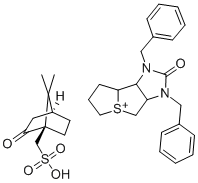
What is trimetaphan camsilate?
Definition
ChEBI: The (S)-camphorsulfonate salt of trimethaphan.
General Description
Trimethaphan camsylate,(+)-1,3-dibenzyldecahydro2-oxoimidazo[4,5-c]thieno[1,2-α]-thiolium 2-oxo-10-bornanesulfonate (1:1)(Arfonad), consists of white crystals or a crystalline powderwith a bitter taste and a slight odor. It is soluble inwater and alcohol but only slightly soluble in acetone andether. The pH of a 1% aqueous solution is 5.0 to 6.0.
Clinical Use
This ganglionic blocking agent is short acting and isused for certain neurosurgical procedures in which excessivebleeding obscures the operative field. Certain craniotomiesare included among these operations. The actionof the drug is direct vasodilation, and because of its transientaction, it is subject to minute-by-minute control.This fleeting action, however, makes it useless for hypertensivecontrol. The drug is ineffective when given orally.The usual route of administration is intravenous.Trimethaphan camsylate is indicated in the treatment ofhypertensive emergencies to reduce blood pressure rapidly.These emergencies may include pulmonary hypertensionassociated with systemic hypertension and acutedissecting aneurysm.
Properties of trimetaphan camsilate
| Melting point: | 245 °C (decomp) |
| alpha | D20 +22.0° (c = 4 in water) |
Safety information for trimetaphan camsilate
Computed Descriptors for trimetaphan camsilate
New Products
Tert-butyl bis(2-chloroethyl)carbamate (S)-3-Aminobutanenitrile hydrochloride N-Boc-D-alaninol N-BOC-D/L-ALANINOL N-octanoyl benzotriazole 4-Hydrazinobenzoic acid 3,4-Dibenzyloxybenzaldehyde 1,1’-CARBONYLDIIMIDAZOLE R-2-BENZYLOXY PROPIONIC ACID 1,1’-CARBONYLDI (1,2-4 TRIAZOLE) 4-HYDROXY BENZYL ALCOHOL 3-NITRO-2-METHYL ANILINE (2-Hydroxyphenyl)acetonitrile 4-Bromopyrazole 5-BROMO-2CYANO PYRIDINE 5,6-Dimethoxyindanone 5-broMo-2-chloro-N-cyclopentylpyriMidin-4-aMine 4-methoxy-3,5-dinitropyridine 2-(Cyanocyclohexyl)acetic acid 2-aminopropyl benzoate hydrochloride 1-(4-(aminomethyl)benzyl)urea hydrochloride tert-butyl 4- (ureidomethyl)benzylcarbamate diethyl 2-(2-((tertbutoxycarbonyl)amino) ethyl)malonate Ethyl-2-chloro((4-methoxyphenyl)hydrazono)acetateRelated products of tetrahydrofuran
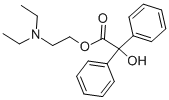

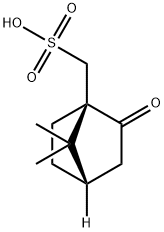
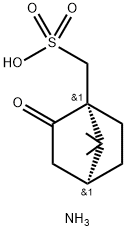
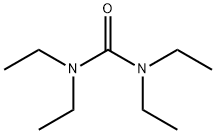
You may like
-
 873-83-6 6-Aminouracil (or) 4-Amino-2,6- dihydroxypyrimidine, (or) 6-Amino2,4-pyrimidinediol 99%View Details
873-83-6 6-Aminouracil (or) 4-Amino-2,6- dihydroxypyrimidine, (or) 6-Amino2,4-pyrimidinediol 99%View Details
873-83-6 -
 55441-95-7 99%View Details
55441-95-7 99%View Details
55441-95-7 -
 N-Vinylformamide 99%View Details
N-Vinylformamide 99%View Details
13162-05-5 -
 Chloro Uracil 1820-81-1 99%View Details
Chloro Uracil 1820-81-1 99%View Details
1820-81-1 -
 207557-35-5 99%View Details
207557-35-5 99%View Details
207557-35-5 -
 2-ethyl-6-methyl-3-hydroxypyridine succinate 99%View Details
2-ethyl-6-methyl-3-hydroxypyridine succinate 99%View Details
127464-43-1 -
 2-ETHYLPYRIDINE 100-71-0 99%View Details
2-ETHYLPYRIDINE 100-71-0 99%View Details
100-71-0 -
 181228-33-1 (S)-Methyl 3-amino-2-((tert-butoxycarbonyl)amino)propanote Hydrochloride (DAP-OMe. HCl) 99%View Details
181228-33-1 (S)-Methyl 3-amino-2-((tert-butoxycarbonyl)amino)propanote Hydrochloride (DAP-OMe. HCl) 99%View Details
181228-33-1